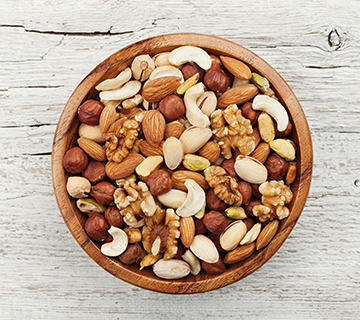Eating Nuts for Your Heart

Nuts have long been considered a great snack. Not only are they relatively inexpensive, they’re easy to store and easy to eat on the go. But research has shown that eating nuts as part of a balanced diet may also be good for your heart.
What makes nuts so heart healthy?
All nuts are packed with protein but they also contain these other heart-healthy substances:
- Unsaturated fats: Research indicates that the “good” fats in nuts, both monounsaturated and polyunsaturated fats, can help lower bad cholesterol levels.
- Omega-3 fatty acids: This healthy form of fatty acid can help prevent dangerous heart rhythms that can lead to heart attacks.
- Fiber: All nuts have fiber, which helps lower cholesterol. But fiber can also help you feel full so you eat less. It can also help prevent type 2 diabetes.
- Vitamin E: It can help plaque from developing in your arteries, which can cause them to narrow, leading to chest pain, coronary artery disease or a heart attack.
- Plant sterols: Occurring naturally in nuts, this can help lower cholesterol.
- L-arginine: This may help improve the health of your artery walls by making them more flexible and less prone to blood clots.
How can eating nuts help your heart?
While research suggests that nuts can benefit your heart and help prevent heart disease, much of the evidence is still inconclusive. However, unless you’re allergic to nuts, there are many reasons to include them as part of a heart-healthy diet.
Nuts can also help lower LDL, or “bad” cholesterol levels. LDL plays a big role in the development of plaque inside blood vessels. Eating more nuts has been shown to lower levels of inflammation linked to heart disease. They can also reduce your risk of developing blood clots that can lead to a heart attack, and improve the health of the lining of your arteries.
How many nuts should you eat?
Up to 80% of a nut is fat—but it’s a healthy fat. On the flip side, that makes nuts high in calories so you should always eat them in moderation. A serving is a small handful, about 1.5 ounces of whole nuts, or 2 tablespoons of nut butter.
Nuts can be a substitute for saturated fats like the ones found in meat, eggs and dairy products. Consider substituting a handful of nuts or a tablespoon or two of a nut spread. Always select raw or dry-roasted nuts instead of those cooked in oil.
What kind of nuts should you eat?
Most nuts have heart-health benefits, but some are healthier than others.
- Walnuts contain high amounts of omega-3 fatty acids
- Almonds, macadamia nuts, hazelnuts and pecans are heart healthy
- Peanuts—technically not a nut but a legume—are relatively healthy
And keep in mind: nuts covered in chocolate, sugar or salt could end up canceling out any heart-healthy benefits.
What about nut oils?
Nut oils are a good source of healthy nutrients but lack the fiber found in whole nuts. Consider using them in homemade salad dressings or when cooking. When overheated, nut oils can become bitter.
Healthy lifestyle changes like eating well-balanced meals and limiting sodium intake are just a few ways to help keep your heart in top shape. If you have high blood pressure, setting goals like completing the Blue Health Assessment can help you monitor and improve your heart health. When you indicate that you have high blood pressure on the BHA and we receive a hypertension-related claim for you, you may be eligible to receive a free blood pressure monitor through the Hypertension Management Program.


